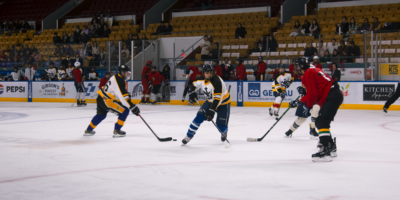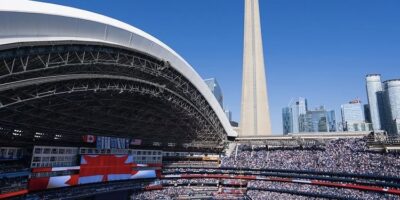Firstly I want to make a few comments on the third issue. The timing of this issue presented a challenge, as was expected. It was difficult to come back from a week of skiing (and equal parts celebration) at Blue Mountain and put together the third issue. I also had another time commitment that weekend that I had to attend to. Luckily, my staff bailed me out and we managed to get the issue done. Special thanks must be given to Krishna Iyer, Lucas Hudson, Leah Kristufek, and Andrew McMahon, all of whom worked diligently to make up for the time I missed on Saturday for my other commitment. The third issue, as many of you noticed, was relatively short on content. This can largely be credited to a requirement to squeeze in three full page ads and an entire election candidates page. It is, of course, not the fault of any of these parties (the Engineering Society or my advertisers, whom we can credit the existence of this paper too) that the issue was low on articles. I had originally planned to produce a 20 page issue, but we were about 1000 words short of this, and on Sunday night I had to make an executive decision to cut out four pages since we can only have the newspaper printed in multiples of four. It was either this or my assistant editor and I would have been up into the wee hours of the morning, something neither of us desired. So for those of you wondering why the newspaper was a little short on text, this is why. Furthermore, if any of you were absolutely stumped on the answers for the Iron Inquistion, I want to state that it was not the mental state of the people whom we asked that yielded such perplexing answers, but instead our failure to change the question from issue 2. The question for the third issue should have read, “What is your favorite ring based activity,” in the Olympic theme, not the question from issue 2 that read, “What do you think should go in E5?” I apologize for not catching this before print.
Now, on to the main issue of this editorial. I had originally planned to write about Canada in this editorial, but I felt it would be difficult to write an editorial on my pride as a Canadian without coming off as clichéd. Instead, I want to offer my thoughts and some background on the situation in Ukraine. For those geopolitics experts out there, I must offer a warning, I am no expert. I have done some research and hope that most of my facts are right. On this note of confidence, I will begin.
For those of you who were wondering, as I was, the proper title when referring to this Eastern European nation is just “Ukraine,” not “the Ukraine.” This is an important distinction to many Ukrainians, who feel that the title “the Ukraine” is a belittling term that originated from Soviet rule, and the nation has since made a pronounced effort to have this usage be eradicated. Ukraine’s battle for the proper usage of its own name is but a small example of its constant fight for independence against the influence of its much larger neighbour, Russia. The recent turmoil in the nation stems from a number of issues, which I do my best to elaborate on below.
Ukraine is a divided nation. The Eastern half of Ukraine, which includes the focal point of the conflict, Crimea, remains predominantly pro Russia. It has historically supported pro-Russia candidates (including ousted Prime Minister, Viktor Yanukovych) and has a higher amount of Russian speakers. The Western half of the nation, which contains the embattled capital, Kiev, is much more sympathetic to an independent Ukraine, identifying more closely with Ukrainian culture and politics. However, both of these areas are nowhere close to uniform in their views, with substantial amounts of Ukrainians living in Russian support hot beds in the East, and a smaller, but still significant, amount of ethnic Russians living in the West. This, along with other ethnic minorities in the nation (to be elaborated on later in this article), add further complexity to the situation. This ethnic mixing, combined with a strained history between Russia and Ukraine, leaves the country extremely vulnerable to political instability. Insofar, Ukraine has seen very few uniting politicians. Although it is a multiparty system, two movements generally dominate politics, leaving a choice between closeness to Russia and distance from the EU and the West, or vice versa. The lack of a Mandela type character capable of uniting a divided nation further exacerbates the country’s fragile position.
Ukraine’s independent history has added little confidence to the strength of national unity. In 2004, Viktor Yanukovych, the same man who is currently on the lam to avoid imprisonment or worse, was elected President. These elections were deemed invalid by domestic and international observers alike, and led to the Orange Revolution, another series of mass protests. This led to another set of elections and the installment of pro West and EU politician Viktor Yushchenko as President. His time in politics was marred by a series of scandals, political upheavals, and most striking of all, a bizarre illness leaving his face scarred and disfigured. Most of the international community, supported by several doctors, believed it to be a result of dioxin poisoning. Several members of his medical team believe that the toxin was so pure it would have had to be made in a laboratory, leading many to speculate it was an attempt on his life by a Russian source. Despite this, he remained president until he was voted out in 2010. Yushchenko’s fall from political greatness can largely be credited to the rise of his former political ally and powerful Ukrainian former businesswomen Yulia Tymoshenko. After some well publicized disputes between herself and Yuschenko, Tymoshenko ran for President in 2010, stealing much of the pro EU and West vote away from Yuschenko, but ultimately losing to the now ousted pro-Russia politician Viktor Yanukovych. Soon after Yanukovych’s election, Tymoshenko was sentenced to prison and ordered to repay vast amounts of money for a series of crimes mainly revolving around the abuse of her Prime Ministerial powers before 2010, when she served in the position. Many international and domestic analysts believe the trials to be politically motivated and an effort on Yanukovych’s part to undermine his most powerful pro-Western and EU rival.
These developments, prior to Yanukovych’s election, already placed Ukraine in an extremely delicate situation. Yanukovych did little to unite the nation. Targeted trials on opposition members, accusations of censorship, general coziness with Russia, corruption allegations, and the decline of the nation into financial ruin further elevated frustrations of ethnic Ukrainians. Ultimately, it was Yanukovych’s decision to abandon an agreement on closer trade ties with the EU that provided the first spark for protestors. By the end of 2013 over a million people had converged on Kiev to protest and demand the ousting of Yanukovych. Restrictive anti-protest measures passed by Parliament in mid-January elevated tensions, and despite attempted back pedalling by Yanukovych and co., the country was in disarray. By February 22, Yanukovych had fled, protestors had taken control of the Presidential administration and Tymoshenko had been freed. Soon after speaker Olexander Tarchynov was named as interim President. A type of counter movement was soon to develop in Crimea, a largely autonomous region within the Ukraine composed of a peninsula on the northern coast of the Black Sea.
Crimea itself has a very complex history. The region plays a critical role in Russia’s geopolitics, as it provides a site for a large naval base and holds national importance to many Russians, who believe that Nikita Krushchev’s move to transfer Crimea to the then Soviet controlled Ukraine in 1954 to be a historical wrong. Crimea, being part of Eastern Ukraine, is predominantly Russian at 58 percent of the total population. It was these demographics that have provided Vladimir Putin with reasoning to occupy much of the Crimean capital Simferopol, and further escalate the conflict with concerns rising of a full scale international conflict. However, it must be understood that Crimea still contains approximately 24 percent ethnic Ukrainians and 12 percent Crimean Tatars. The Tatars are Muslims of Turkish ethnicity, who have long resided in Crimea, previously making up the majority of the population before Stalin deported a sizeable population in 1944. This ethnic complexity, along with a host of other factors, discredits Putin’s blanket statement of having the right to occupy the region simply to protect Russians in the area, many of whom previously had no claim to actual Russian citizenship until they were given passports by the nation to increase their territorial claims.
As I have outlined in my summary of the situation, Ukraine is a complicated nation with many players and factions. Russia may have a rightful claim to Crimea that could be justified through due process when Ukraine is in a more stable situation. However, allowing Putin and his cronies to grab fragile pieces of Europe at their whim just because they have a sizeable Russian population sets a terrible precedent. There exists a sizeable Russian diaspora in a host of other nations in Europe, many of which are small and susceptible to Russian meddling. If Russia is allowed to simply step in and snap away pieces of a nation now, what is stopping them from doing so in the future? Also, at what point will Putin realize that the presence of a Russian population is not a required justification for his actions? If I were an Estonian, a Lithuanian, or a citizen of another nation close to Russia and with a history of Russian influence, I would be sweating.
Many people are understandable weary and critical of an American solution to the problem. It is difficult for America to act as a moral superior as they have a recent history of needlessly meddling in the affairs of other sovereign nations, leading to two needless, bloody wars. However in the world we live in, we have no other nation with a big enough stick to subdue Putin’s ambitions. A President in his final term, Barack Obama must find the courage and wherewithal to stop Putin at whatever means necessary. Vladimir Putin is a former KGB agent, hell bent on Russian dominance and a return to what he believes is their natural role as global superpower. Many comment that an occupation of Ukraine and further expansion of the Russian Federation would almost surely lead to the economic collapse of the nation. However, Putin blindly spent over $50 billion on a two week sporting event without blinking an eye. I have my doubts that sanctions or economic instability will have little influence on such a bull headed man. Ultimately, subduing Russia lies with America’s military might. Despite their past costly mistakes, America remains the last defender of freedom, justice, and due process. Obama must leave Putin with a choice: get your ass kicked or back off. As casual observers, all we can do is pray that the Russian President chooses the latter.




Leave a Reply